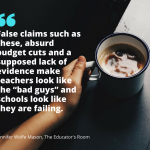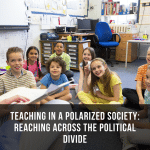Have you signed up for The Educator’s Room Daily Newsletter? Click here and support independent journalism!
There is a lot of news lately about Florida’s “Don’t Say Gay” bill. But it isn’t the only one. In Indiana, there is a bill that would ban any discussion of sexual orientation or gender identity in classrooms. Another bill in Kansas would charge teachers with a misdemeanor if they use material depicting homosexuality in any way, regardless of the nature of the content.
Why LGBTQ+ Representation Matters
Regressive shifts like these make me ache for students who do not fit in the mold of closed-minded people. “Don’t say gay” laws will rob LGBTQ+ students of the representation they deserve. Students should not only know Alan Turing’s accomplishments, but also the discrimination he suffered as a gay man. Students of all genders and sexualities should be able to read books that feature queer, non-binary, gay, or lesbian characters. These things matter and they have made a positive impact on all students, but especially the LGBTQ+ kids who need it most.
The last decade has been largely positive when it comes to media representation of diverse gender and sexual orientations. It was unheard of when Degrassi featured its first trans character, Adam Torres, back in 2010 (the week I started high school). There will always be more room for progress, but there is more visibility now than ever for LGTBQ+ people – as it should be! What hurts the most about these “Don’t say gay” bills is they seek to push our LGTBQ+ youth back into the shadows. Doing so is violence.
“Don’t Say Gay” Endangers Vulnerable Students
Codifying silence around anything non-cis or non-hetero does damage in addition to removing representation. It creates unwelcoming and dangerous environments for some of our most vulnerable students. These bills ensure our LGTBQ+ students do not feel supported and do not have a space to be themselves – and that is alarming.
Over the years people have asked me many times why I care so much about these issues. They ask me why a cis-gender straight woman cares about things that do not affect me. The truth is, I know the feeling of being othered all too well.
My Story
When I was in high school, I decided to come out to my friends as bisexual. I was naive at the time. Within about three hours, the entire population of my small, conservative school had found out as well. It was not fun being one of three students who were out of the closet at that time, and our school did little to represent or support students outside the “norm”. It came to a fever pitch when the bullying I received resulted in me being outed to my parents against my will. It was not the time nor method I would have chosen to reveal this information to them. While my parents did not disown me, they simply reassured me it was just a phase. Shortly after, I would recant my bisexuality to them, and I keep it hidden from them to this day. It’s just easier this way.
In college, over a hundred miles away from my parents, I became much more carefree about my sexuality. If it came up I would share that I was bisexual, but I didn’t feel the need to disclose it to everyone. However, one night, a man I was dating found out I had briefly dated a girl he knew. He proceeded to verbally abuse and threaten me into the wee hours of the night. I decided then to hide my sexuality from any man I dated. Thankfully I was able to unpack this later in therapy and no longer do.
Navigating LGBTQ+ Bias as a Teacher
Once I became a teacher, I swore I would never let my sexuality be known. I live in a red state. I did not know a single teacher in my entire network who was out at school. Naturally, I feared for my job security. For the most part, keeping the secret was not too hard as my romantic relationships happened to be with men. But I always feared how open I could be about my life if I ended up in a serious relationship with a woman.
I still faced challenges. Every once in a while, I was questioned for standing up for LGTBQ+ rights or asking kids not to say, “That’s so gay.” Despite being careful, a colleague of mine came up to me between classes one day and said loudly, “You know, the students have been saying they think you’re a dyke.” I had joined what I thought was a progressive school community a mere two months prior. I feared making waves that would backfire on me. I did not report her or even acknowledge how inappropriate the statement was. I simply told her I had a boyfriend (which was true) and shoved the experience out of my mind. I won’t pretend that it didn’t make me second-guess how I carried myself at work.
LGBTQ+ Youth Deserve Better Than “Don’t Say Gay”
I often wonder how my experience could have been different. I doubt that if I had attended a more supportive school that I would have been forcefully outed to my parents. Maybe if my ex-boyfriend had grown up with different messaging – that didn’t make his masculinity feel threatened by my bisexuality – that night could have gone differently. And if my coworker, a widely known racist and homophobe, had ever had consequences for those behaviors she may not have tried to out me too. I wonder if those people had grown up in schools and communities that celebrated a variety of identities and represented them in a multitude of ways instead of conforming to stereotypes, how different my story could be.
Sadly, “Don’t say gay” bills will ensure stories like mine continue to happen. “Don’t say gay” legislation does not just alienate vulnerable students, it is permissive of hateful ones. Anti-LGBTQ+ bias is the reason LGBTQ+ youth have higher rates of depression and suicide, and why so many keep their identity a secret. It is why I was still not comfortable attaching my real name to this essay.
Bills like this send a clear message to students and teachers from the politicians that do not support them. When bills like this pass, LGTBQ+ students are further isolated. These “Don’t say gay” bills enforce silence about LGBTQ+ identities, so LGBTQ+ youth have no way of knowing who their allies are, and bigoted students have no repercussions for the harm they cause. “Don’t say gay” bills are dangerous for LGTBQ+ students and teachers. I know all too well how painful silence about LGBTQ+ identities can be.
Editor’s Note: If you enjoyed this article, please become a Patreon supporter by clicking here.
Marley Wilder was previously a teacher in Arizona, specializing in low-income and diverse environments.






Thank you for sharing your story and for pushing us all to think through what these ridiculous bills will do to our students.
I think it’s so wonderful that you wrote about your experience as a child and as a teacher perspective. I also don’t understand the “don’t say Gay” bill, I believe the more we ignore individual who are in the LGBTQ+ community the harder it will be for those students and staff to be who they want to be.